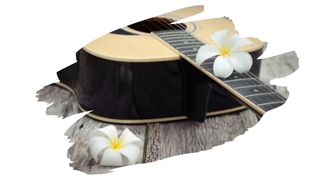If you have a real ear for music, you can tell the difference in sound between various tonewoods.
But, do solid wood guitars sound better over the years? And if they do, why?
Well, in this post, you’ll learn why something called ‘moisture content’ can greatly impact the sustain of your guitar — yet has little impact on the volume of your instrument.
And keep reading to discover the best way to store your guitar — and keep it away from humidity.

This post may contain affiliate links to products that we receive a commission for (at no additional cost to you). Learn more here.
Do Solid Wood Acoustic Guitars Get Even Louder With Age?
Not necessarily louder, but they do tend to produce better sound quality.
You see, when it comes to sound amplification, the flexibility of guitar strings have the greatest effect on volume.
However, when it comes to sound resonance, the chamber of the guitar — and the material it’s made from — have the most impact.
So Why Do Solid Wood Guitars Sound Better Over Time?
The aging of wood helps to improve woods ability to hold sustain.
Now, sustain refers to how long a note resonates for. The longer that note holds, the better the sustain.
And when it comes to wood, the harder the timber the better the sustain. Which is one reason why Mahogany wood guitars sound better than Poplar wood guitars.
Related Post: Deciding Between Poplar Vs Mahogany Wood For Your Guitar
But, here’s the thing; timber can become even harder over time. And this is because, as wood ages, it becomes ever more dry.
So, the sound quality improvement that you’re hearing is a result of woods decreasing moisture content.
And What Is Moisture Content Exactly (As It Relates To Wood)?
Moisture content is simply how we refer to the amount of water in a piece of wood.
When wood is first logged, it has a moisture content of around 100%. However, through seasoning (which is a months-long process designed to dry-out freshly cut wood), its moisture content falls to 19% or less.
But, even after seasoning, wood can continue to dry out even further. And over the months and years, (if you manage to keep wood away from moisture and humidity), what little moisture left in wood will continue to evaporate.
And when there’s very little moisture in lumber, it makes wood much harder, increasing the tensile strength of this material. And that, in turn, improves the sustain of a wooden guitars body.
How Long Do Acoustic Guitars Last Before They Wear Out? A well made guitar — crafted from top quality timber — can last up to 20 years. Although, if you really treat a classic guitar with kid gloves, they can easily last 30+ years with the right care.
And How Should I Store My Acoustic Guitar (So That It Stays Dry)?
If you want to keep that guitar sounding great, you need to prevent humidity from getting into it.
So, you should always store the guitar in it’s case (whenever possible). And use silica gel packs to keep the interior of that case free of moisture/humidity.
But, if keeping your guitar in a case 24/7 isn’t the most practical option for your setup, you can use a dehumidifier instead. Simply keeping your guitar propped up, and a dehumidifier nearby, can work in a pinch too.
And, if you are really worried about humidity getting into your guitar, you can track humidity levels by using a hygrometer. Digital hygrometers are a device that measure the exact level of humidity in a room.
So, use the hygrometer (coupled with an adjustable dehumidifier) to maintain a relative humidity (RH) environment range of 45-55% RH around your guitar.
To Wrap Up, Here Are The 3 Key Takeaways From This Post…
- 1). Solid wood acoustic guitars sound better over time due to the reduced moisture content in aged-wood.
- 2). As wood becomes ever dryer, (due to it’s reducing moisture content), it becomes harder and more stable.
- 3). As wood hardens, it’s ability to sustain a note improves.
References:
Fundamentals Of Guitar Tone | The Journal of the Acoustical Society of America



